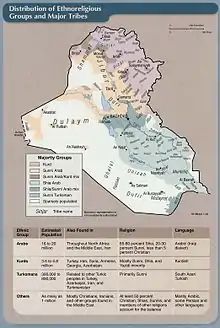Chegini (tribe)
The Chegini tribe (Kurdish: چەگینی ,Çengînî, Persian: چگنی) is a mostly sedentary[1] Kurdish[2] tribe which lives in Lorestan Province and scattered around Qazvin Province and Fars Province in Iran. The tribe also lives in Kurdistan Region and Kirkuk in Iraq.[3][4] While the tribe migrated to Lorestan from Northwestern Iran, not much info exist on its origins.[5]

Early scrutiny
Charles MacGregor classified the tribe as Kurdish in his topographical and ethnographical oeuvre from 1872.[6] Oskar Mann however argued in 1910 that the tribe was of Romani origin but had kurdified after migrating to Kurdistan.[7]
History
During the reign of Tahmasp I, the Chegini Kurds settled in Khorasan as they were on their way to India. In Khorasan, they prospered under the protection of the shah. In 1597, Sharafkhan Bidlisi wrote that the tribe lived by brigandage and intercepting the roads. Moreover, unlike other Kurdish tribes, they had no emir or mirza which could lead the tribe.[8]
See also
References
- Ehsan Yarshater (1992). Encyclopaedia Iranica. University of California. p. 110.
- Bagher Ali Adelfar, Fatemeh Malehmir Chegini (2016). "An investigation into the role of Chegini tribe in the first period of Safavid era (1523 AD-1578 AD/930 HQ-986 HQ)". Ponte Academic Journal. 72 (12). doi:10.21506/j.ponte.2016.12.18.
- "ČEGĪNĪ". Iranicaonline. Archived from the original on 17 November 2016. Retrieved 26 April 2019.
- Archibald Roosevelt (1944). "Kurdish tribal map of Iraq : showing the Iraq portion of Kurdistan and the major Kurdish tribal divisions within Iraq". Yale University.
- Oberling, Pierre (1990). "Čegīnī". Iranica Online. Retrieved 30 January 2021.
- Charles MacGregor (1872). Central Asia. Part V. A contribution towards the better knowledge of the History, Ethnography, Topography, and resources of part of Asiatic Turkey and Caucasia. Calcutta: Foreign Department Press. p. 591.
- Oskar Mann (April 1910). Die mundarten der lur-stmme im sdwestlichen persien (in German). Berlin: DE GRUYTER MOUTON. p. xxiv. ISBN 3111071219.
- François-Bernard Charmoy (1873). Chèrefnameh: ou, Fastes de la nation kourde (in French). Oxford University - Commissionnaires de l'Académie impériale dessciences. pp. 189–191.
Further reading
- Ebrahimi, Masoumeh; Negahban, Farzin, "Chiginī", Encyclopaedia Islamica, doi:10.1163/1875-9831_isla_COM_05000082
- علی کرمی کیان (2016), نسب نامه طایفه شه کرم ایل چگنی لرستان, ISBN 978-6002602299
- چگنی (چگینی) (in Persian), Encyclopedia of the World of Islam, retrieved 25 May 2019
- "دائرة المعارف بزرگ اسلامی:چگنی", Centre for Great Islamic Encyclopaedia (CGIE) (in Persian): 3, retrieved 26 June 2019